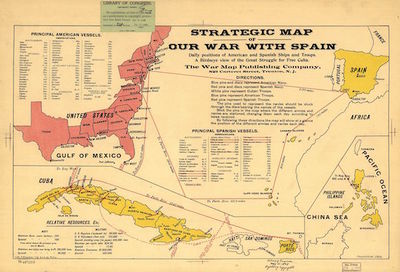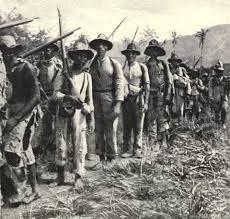 (OPINIÓN) “MAS SE PERDIÓ EN CUBA”, UNA FRASE DOLOROSA..
(OPINIÓN) “MAS SE PERDIÓ EN CUBA”, UNA FRASE DOLOROSA..
En el año de 1868 se iniciaron las guerras independentistas cubanas. El Padre de la Patria, Carlos Manuel de Céspedes, liberó a sus esclavos y los sumó a la lucha contra el colonialismo. Asi se iniciaba la debacle del Imperio Español.
Después de décadas de guerras en América, el ejército español intentaba proteger su colonia más preciada, Cuba. Pero no previeron la fuerza que ganaba Estados Unidos y su capacidad estratégica, tanto desde lo político, como desde lo militar.
El 15 febrero de 1898 estalló en la Bahía de La Habana el buque estadounidense Maine, lo que se interpretó como un ataque de España. Este fue el argumento necesario para que Estados Unidos tomara partido en el conflicto cubano – español.
Estados Unidos impulsó una ofensiva militar que forzó a España a firmar un documento de paz conocido como Tratado de Paris. En esta reunión no participaron los cubanos. Fue un acuerdo al margen de quienes verdaderamente habían ganado la guerra, los mambises.
A cambio de 20 millones de dólares España renunció a Cuba, Filipinas, Puerto Rico y Guam. Era la única salida coherente para evitar una guerra con la mayor potencia militar. De esta forma además cerraba un largo período de desgaste económico y conservaba otros territorios estratégicos (Islas Canarias, las Islas Baleares y Guinea Ecuatorial).
Pero la paz pactada con un par de firmas, estadounidenses y españolas había costado sangre, sudor y lágrimas a dos pueblos con una historia común desde 1492. España y Cuba habían perdido lo más valioso de una nación, miles de ciudadanos.
Quizás por eso en España se suele usar la frase “más se perdió en Cuba” cuando las cosas no salen como se espera. Es un modo de restar peso, o significación a una pérdida y tiene, desde luego, un fundamento histórico en las guerras de independencia cubanas.
Las bajas ocasionadas en combate, por enfermedad, incluso por la hambruna, fueron muchas para ambos bandos. Quedaron en la memoria colectiva y la historia les hace justicia según desde dónde se mire el conflicto. Se dice que, al terminar la guerra, los supervivientes españoles que volvían a sus tierras regresaban cantando, por la felicidad de no haber muerto en combate. En cambio, los mambises fueron desarmados y retirados con un salario irrisorio, cosa con la que no quedaron muy conformes, según los historiadores cubanos.
El resultado de las guerras independentistas fue medio país devastado, cañaverales quemados, cientos de poblaciones rurales en la más absoluta miseria, insalubridad y hambruna. Así entró Cuba al siglo XX. España, por su parte, había perdido una significativa área de su territorio y su mayor fuente de ganancias económicas.
“MAS SE PERDIO EN CUBA”
Pasaron los años y hubo otra vuelta a Cuba de españoles, en este caso huyendo de las penurias de la Guerra Civil (1936-1939). En la Isla encontraron una continuidad familiar, social y cultural que les permitía reordenar su vida fuera de España. Los vínculos entre ambos pueblos están sobradamente argumentados por historiadores con distintas visiones. En el consenso común está el hecho de que los períodos entre 1868 -1878 y 1895-1898, fueron una época de pérdidas de todo tipo para ambos bandos.
Cubanos y españoles mantenemos la frase “más se perdió en Cuba”. Unas veces con matiz jocoso, como de quien minimiza un tema; y otras con un poco de dolor, de quien recuerda que no hay nada más valioso que la vida, la paz y la independencia.
 (OPINION) “MORE WAS LOST IN CUBA”, A PAINFUL SENTENCE …
(OPINION) “MORE WAS LOST IN CUBA”, A PAINFUL SENTENCE …
In the year 1868, the Cuban independence wars began. The Father of the Nation, Carlos Manuel de Céspedes, freed his slaves and added them to the fight against colonialism. Thus began the debacle of the Spanish Empire.
After decades of wars in America, the Spanish army tried to protect its most precious colony, Cuba. But they did not foresee the strength that the United States was winning and its strategic capacity, both politically and militarily.
On February 15, 1898, the American ship Maine exploded in the Bay of Havana, which was interpreted as an attack by Spain. This was the necessary argument for the United States to take sides in the Cuban – Spanish conflict.
The United States launched a military offensive that forced Spain to sign a peace document known as the Treaty of Paris. The Cubans did not participate in this meeting. It was an agreement on the margin of those who had truly won the war, the Mambises.
In exchange for 20 million dollars, Spain renounced Cuba, the Philippines, Puerto Rico, and Guam. It was the only coherent way out to avoid a war with the greatest military power. In this way, it also closed a long period of economic decline and retained other strategic territories (Canary Islands, the Balearic Islands, and Equatorial Guinea).
But the peace agreed with a couple of firms, Americans and Spanish had cost blood, sweat and tears to two peoples with a common history since 1492. Spain and Cuba had lost the most valuable of a nation, thousands of citizens.
Maybe that’s why in Spain the phrase “most lost in Cuba” is usually used when things do not go as expected. It is a way of subtracting weight, or significance to a loss and has, of course, a historical foundation in the Cuban wars of independence.
The losses caused in combat, by disease, even by famine, were many for both sides. They remained in the collective memory and history does them justice according to where the conflict is viewed from. It is said that, at the end of the war, the Spanish survivors who returned to their lands returned singing, for the happiness of not having died in combat. On the other hand, the Mambises were disarmed and retired with a derisory salary, something they did not like very much, according to Cuban historians.
The result of the independence wars was half devastated country, burned cane plantations, hundreds of rural populations in the most absolute misery, insalubrity and famine. This is how Cuba entered the 20th century. Spain, on the other hand, had lost a significant area of its territory and its greatest source of economic gain.
“MORE WAS LOST IN CUBA”
Years passed and there was another return to Cuba of Spaniards, in this case fleeing from the hardships of the Civil War (1936-1939). In the Island, they found a family, social and cultural continuity that allowed them to reorder their life outside of Spain. The links between both peoples are amply argued by historians with different visions. In the common consensus is the fact that the periods between 1868 -1878 and 1895-1898, were a time of losses of all kinds for both sides.
Cubans and Spaniards keep the phrase “more was lost in Cuba.” Sometimes with a jocular nuance, like someone who minimizes a topic; and others with a little pain, of those who remember that there is nothing more valuable than life, peace, and independence.
Agencies/ CiberCuba/ Gretchen Schez/ Internet Photos/ Arnoldo Varona/ www.TheCubanHistory.com
THE CUBAN HISTORY, HOLLYWOOD.










